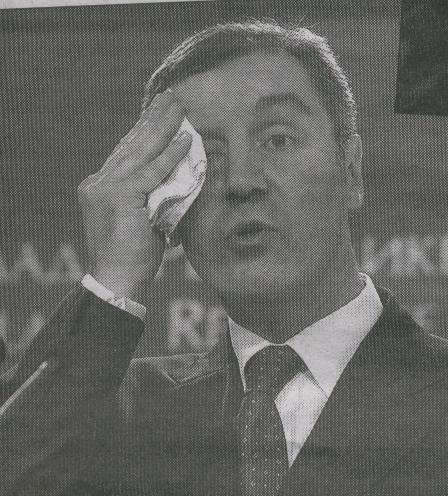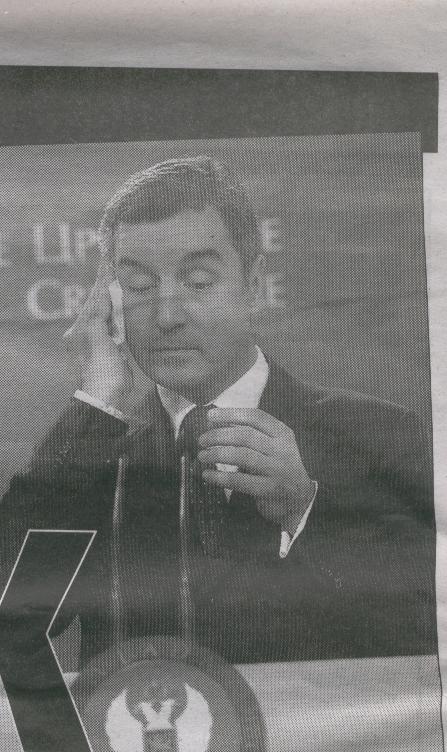 |
Playing the referendum game with Montenegro
by Luka Brailo
  
The pre-referendum fever that has been shaking Montenegro for the past few years is now entering its stormy finale. After a month of hard negotiation conducted by the Slovak diplomat Miroslav Lajčák, on behalf of the European Union and its foreign-policy spokesman Javier Solana, with representatives, on the one hand, of the pro-independence ruling coalition headed by prime minister Milo Đukanović and, on the other, of the opposition bloc committed to Montenegro’s continued union with Serbia, Brussels has proposed - more precisely decreed - rules for the coming plebiscite on Montenegro’s future status. The question ‘Do you wish the Republic of Montenegro to be an independent state with full international subjectivity?’ is to be put to voters by 14 May 2006 at the latest. A decision in favour of Montenegrin independence will be considered valid if supported by 55% of those who vote, provided that a majority of the electorate turns out.
It is immediately evident that the EU has introduced into the Montenegrin plebiscite the principle rule of qualified majority, which is without precedent in the area of former Yugoslavia. In the cases of Croatia, Bosnia-Herzegovina and Macedonia, it was necessary to obtain a simple majority of those who voted and a turnout of 50% plus 1 of registered voters. The Slovene law governing the independence referendum, meanwhile, envisaged independence on the basis of 50% plus 1 of those with the right to vote. A similar turnout threshold is the practice likewise in, for example, Italy, Portugal, Lithuania and Sweden. In most EU states the referendum decision is made by a majority of those actually voting - a referendum majority being respected in Austria, Germany, France, Spain, Iceland, Sweden, Greece, Finland, Italy, etc - while in Great Britain and Denmark such a decision is valid only if at least 40% of registered voters cast votes in favour.
Considering these examples, as well as those of last year - when the citizens of France and Denmark rejected the EU constitution, and those of Spain accepted it, on the basis of a simple majority and a low turnout - it comes as no surprise that Brussels’ special rules for Montenegro have caused a political storm in that country. The unionist bloc, composed of the Socialist People’s Party (SNP), the People’s Party (NS), and the Democratic Serb Party (DSS) is not very happy with this proposal, since it had demanded the formation of a transitional government, a turnout threshold of 50%, 66% of actual voters, special control over the police, voting rights for 260,000 Montenegrins living in Serbia. etc. The Brussels rules will nevertheless eventually be accepted by them too, since Lajčák’s - or more accurately Solana’s - ‘offer’ has been well-received by official Belgrade, whither the most prominent member of the unionist bloc, SNP leader Predrag Bulatović, repaired in order to be told what his position should be.
Anti-democratic rules
The Brussels offer is not being rejected a priori by members of the pro-independence bloc, composed of Đukanović’s Socialists, Ranko Krivokapić’s SDP and other smaller parties and groupings. They warn, however, that the rules operate against a democratic choice and infringe the principle of equality of all citizens in the coming referendum.
The fact is that the mathematics of applying the Brussels 55: 45 percent shows that in the case of Montenegro the unionists’ NO is worth 1.2 votes, while a pro-independence YES is worth only 0.8. In the case of Montenegro, in other words, the EU has abandoned the basic principle that participants in a referendum should have equal chances. This represents a direct contravention of EU proclamations regarding the need to uphold the European standards and democratic rules allegedly practised by its 25 members.
The approach of Brussels to the plebiscite on Montenegrin independence opens many questions. One of these is what will happen if 54.9% of Montenegro’s inhabitants vote in favour of independence. Does this mean that Serbia-Montenegro remains in existence, despite the fact that only an evident minority of 45.1% has voted in its favour? Only the drafters of these unusual referendum rules can provide the answer. It seems that Solana and similar Euro-bureaucrats do not like the idea of Montenegro’s eventual independence, especially at a time when Serbia is about to lose Kosovo one way or another. It is indeed difficult not to avoid the impression that the special rule of a qualified majority for the Montenegrin referendum was contrived in order to make it more difficult for the pro-independence bloc, which is leading the unionists in the public-opinion polls, to win. Contrived, put differently, in order to create or improve the chances for a minority to invest the Serbia-Montenegro union with new life in a legal manner and with EU blessing. Such an outcome, however, would throw this dysfunctional union (commonly termed Solania) into even greater crisis, since it cannot be expected that the ruling coalition, after winning between 50.01 and 54.99 percent of the votes, would simply acknowledge defeat.
Nevertheless, despite all the uncertainties inherent in the rules imposed by Solana and Lajčák, it would be most surprising if the EU council of ministers did not approve them at its meeting of 27 February [it did]. It is also difficult to believe that the Montenegrin assembly will not pass a ‘European’ referendum law by the end of February, despite its adverse implications for the pro-independence bloc, given that it was the Montenegrin government which invited EU mediators to find a common language between it and the opposition. The ruling coalition cannot risk conducting a referendum on independence alone, while the unionist bloc - with the Brussels wind at its back - no longer contemplates a boycott. What Đukanović and his pro-independence allies now need to do is to ensure that 56% of their supporters come out to vote. And to convince them that the current government does not intend to turn the idea of Montenegro’s emancipation into a project for the acquisition of uncontrolled power.
Luka Brailo is on the editorial board of Monitor (Podgorica). This article has been translated from Feral Tribune (Split), 24 February 2006
|